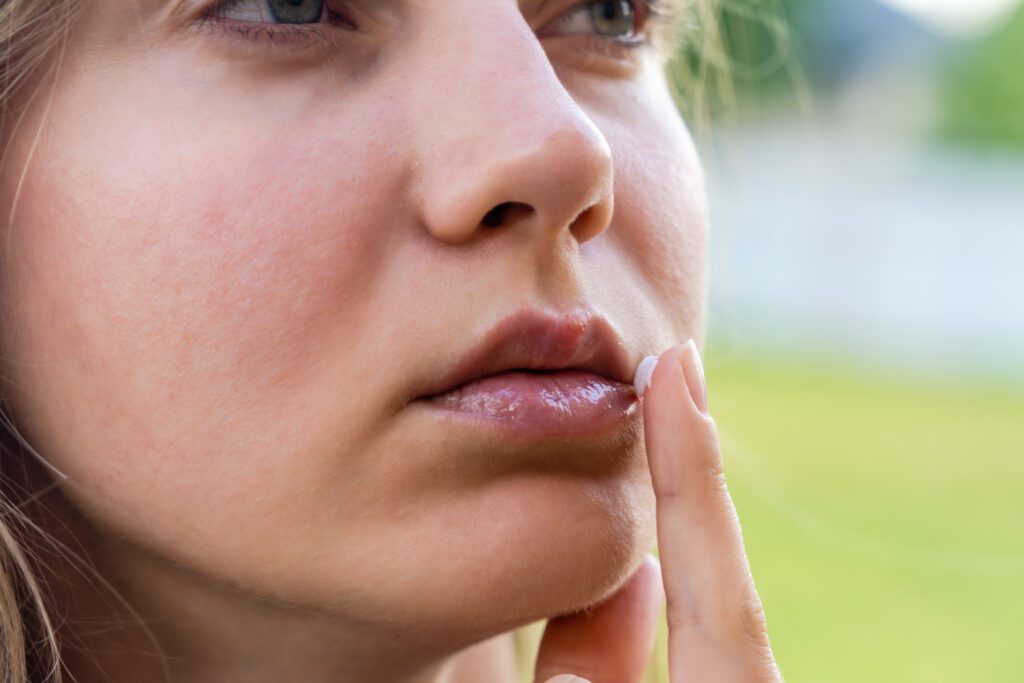The winter season is brutal on our lips, no matter where in the country we live. While the Sunshine State does not see the cold and snow of the states to the north, it does get colder and much drier than other times of year; both are bad news for your lips. Add in travel, and the winter’s dry air can lead straight to chapped lips. Take our quiz to learn how to take proper care of your lips in the winter, avoid or treat chapped lips, and give yourself the gift of healthy lips this winter season.
1. The skin on your lips is at risk of becoming dry and chapped as it is thinner and more sensitive than the skin on the rest of your body. Which below explains why this is?
A. The skin on your lips is more delicate because of the different color between the skin of your lips and the skin of your face.
B. The skin on your lips doesn’t contain any oil glands.
C. The skin on your lips is actually not skin.
D. The skin on your lips contains different chemicals than the skin on the rest of your body.
2. What are the symptoms of chapped lips, an inflammation of your lips that is also called cheilitis?
A. Dry or scaling lips
B. Cracking and/or peeling skin
C. Itching and/or mild pain, like stinging
D. Sores on your lips and in your mouth
E. All of the above
3. What of the following are the most common causes of chapped lips?
A. Sunburn
B. Cold, hot, or dry weather
C. Frequently licking your lips
D. Medical conditions
E. All of the above
4. Which of the following is a medical condition that can cause chapped lips?
A. A vitamin deficiency, like a deficiency in iron or vitamin
B. Allergies
C. Dehydration
D. A thyroid disorder or some autoimmune disorders
E. A reaction to a medication
F. All of the above
5. Which of the following is NOT a way to prevent or treat chapped lips?
A. Staying hydrated
B. Exercising
C. Using lip balm or ointment with sunscreen of SPF 30 or greater as needed throughout the day
D. Avoiding licking, picking, or biting your lips
E. Using a humidifier in your home
6. Which of the following is an ingredient you should look for in your lip balm treatment?
A. Ointments like petroleum jelly or glycerin
B. Oils such as mineral oil or castor seed oil
C. Moisturizing compounds like ceramide or dimethicone
D. Sun-protective compounds like titanium oxide or zinc oxide
E. All of the above
7. True or false? Occlusives like vaseline petroleum jelly and beeswax seal in existing moisture on the lips but don’t actively add moisture. They should be used after humectants like glycerin and hyaluronic acid to seal in moisture.
8. True or false? Some ingredients in lip balm can irritate chapped lips rather than soothe them; the issue can be that you’re using an occlusive option on lips that are already chapped.
9. Which of the following are ingredients that could be in your lip balm that could irritate your chapped lips?
A. Fragrances and flavoring
B. Compounds like lanolin, menthol, eucalyptus, or camphor
C. Certain types of waxes
D. All of the above
10. True or false? If your lip balm causes a stinging, burning or tingling sensation, then you should stop using it.
11. True or false? If you treat your chapped lips and they get worse or don’t improve after more than a few weeks, see your healthcare provider for more advanced treatment options.
compiled by ERIKA ALDRICH / Information from The Cleveland Clinic and medlineplus.gov
ANSWERS:
- B. The skin on your lips doesn’t contain any oil glands.
- E. All of the above
- E. All of the above
- F. All of the above
- B. Exercising. The rest are ways to prevent chapped lips.
- E. All of the above
- True
- True
- D. All of the above
- True
- True
